Click on a picture to enlarge it
| Snakes in Movies Group Pages |
All Movie Snakes Must Die! |
| All Movie Snakes Want to Kill You! |
| Dancing With Snakes |
| Giant Monster Snakes |
| Pet Snakes |
| Shooting Snakes |
| Snake Bites |
| Snake Charmers |
| Snake Face |
| Snake Fights |
| Snake People |
| Snake Pits |
| SnakeSexploitation |
| Snakes & Skulls |
| Snakes Run Amok |
| Snakes Used as Weapons |
| Snakes Used for Comedy |
| Snakes Used for Food or Medicine |
| Snakes Used Realistically |
| Throwing and Whipping Snakes |
| Kinds of Snakes |
| Rattlesnakes |
| Cobras |
| Black Mambas |
| Boas, Pythons, and Anacondas |
| Kingsnakes and Tricolor Snakes |
| Unusual Species
|
| Settings |
| Snake in the House! |
| Snakes in Beds |
| Snakes in
Jungles and Swamps |
| Snakes In Trees |
| Genres & Locations |
| Snakes In Westerns |
| Snakes in Asian Movies |
| Herps in Australian Movies |
| Herps in James Bond Movies |
| Herps in Silent Movies |
| Herps in Spielberg Movies |
| Snakes in Movies | ||
| Distant Drums (1951) | ||
| Spoiler Alert ! Some of these pictures and descriptions may give away plot details that you might not want to know before watching the film. |
||
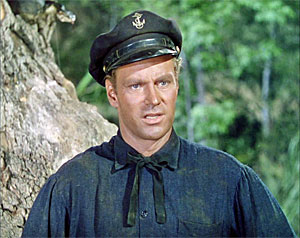 |
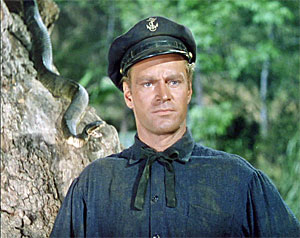 |
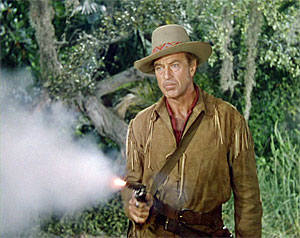 |
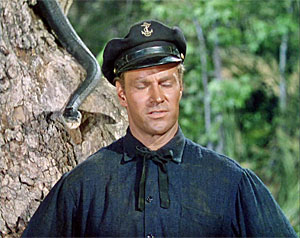 |
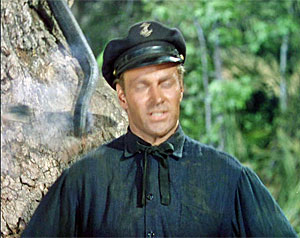 |
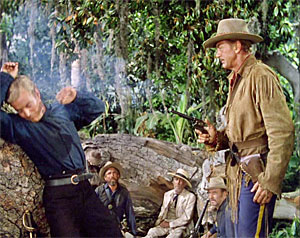 |
 |
 |
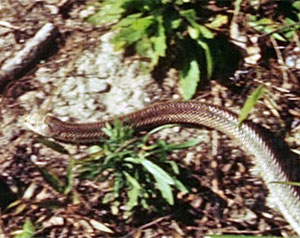 |
| Distant Drums is a mix of western, action, and jungle adventure, with a love story thrown in so we can look at someone more attractive than a bunch of dirty soldiers in a swamp, all filmed in glorious Technicolor. Florida and the Everglades look great here. But the movie is a bit of a cliche - the kind of movie where the sound effects are cut out and somebody says "Something's wrong. It's too quiet. I don't like it." (We hear that a couple of times.) The movie is probably only notable because it is the movie that first recorded and used the Wilhelm Scream, an over-the-top man scream screaming sound that became a Hollywood in-joke that has been used in hundreds of movies including the Star Wars movies, the Lord of the Rings movies, and movies made by Quentin Tarantino and Tim Burton among many others. (There's a fun compilation video showing some of the uses of the scream on YouTube, but it doesn't include the times it was used in this movie. ) Gary Cooper is U.S. Army Captain Quincy Wyatt in 1840 Florida during the war against the Seminole Indians. He leads a small group of soldiers to blow up a fort but afterwards they are forced to hike 150 miles through the miserable swamp that is the Everglades to get back to safety along with several civilians they rescued, all the while chased by painted-up Injuns on the warpath. And yes, they play drums to communicate with distant Seminoles. The first snake shows up when a young Navy Lieutenant, Tufts, is in a canoe on his way to Wyatt's home. He sees a snake crawling on the ground that he describes as "weird," along with some other animals including a cougar and flamingos. The second snake shows up on a tree behind Tufts. It crawls down slowly and opens its mouth about to attack him while he is talking to Wyatt. But Wyatt shoots it with his revolver in true heroic cowboy style following the action movie code that all snakes must die. The best part of this scene is when Mari Aldon, who plays Judy Beckett Wyatt's love interest, tells Tufts: "You're a very luck man. You know what kind of snake that was? A Cottonmouth Water Moccasin." Tufts asks her "How would a lady like you know about a thing like that, maam?" She replies: "I've dealt with snakes before, Lieutenant." Until this point I didn't realize that she was obviously a herpetologist with extensive field experience with Agkistrodon, but I guess that should have been apparent from her appearance. The snake is probably some species of Nerodia or water snake. You can see a string slowly pulling the snake towards Tufts, and you can see the snake's tongue flicker in and out, so it's definitely a live snake at that point. But after they cut away and return it awkwardly has its mouth open and twists its head with its mouth open to the right, as if something is pinching its neck. Then we see Wyatt shoot and the snake's head pops off. I think that they somehow rigged the snake to be decapitated along with a small puff of smoke to make it look like a bullet hit it. I can't tell if the snake was alive when it was decapitated or even if it was a fake at that point, but it looks real. |
||
 |
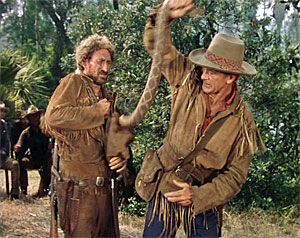 |
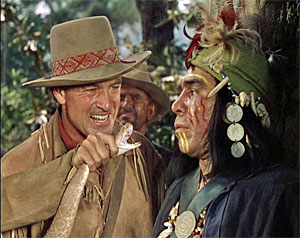 |
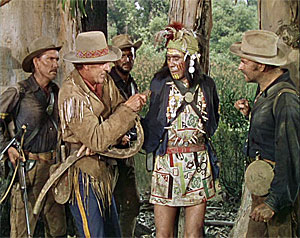 |
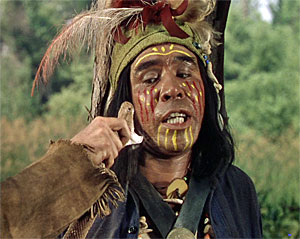 |
|
| It's the third snake in the movie that's my favorite. They capture a Seminole and decide to torture him for information. Wyatt calls to his guide and he immediately goes and gets a saddle bag with a rattlesnake in it. (I guess it must have been standard U.S. Army procedure to carry one around in case they needed to torture someone.) He holds the snake up to the Seminole's face to make him talk. (Torture always works in the movies and TV but not so much in real life.) This scene is unintentionally hilarious because Cooper pulls a fake snake out of the bag, but then when he holds the snake, it is a double-exposed shot of a real live red-diamond rattlesnake that somebody else is holding up in front of Cooper at an angle impossible for his arm. When we next see Cooper holding the snake, it is very obviously a painted rubber rattlesnake that he has to keep shaking with one hand to make it look like it's alive and rattling. (Of course we hear the sound of a rattle shaking.) When he holds the snake up to the Seminole's face, it's also a double-exposed shot and you can clearly some unrealistic artifacts of the special effect. But I'm sure this was all perfectly believable to the 12-year-old boys who watched this back in 1951 and at least until VCR and DVD technology allowed nerds like me to freeze frames and ruin all the magic. | ||
|
||